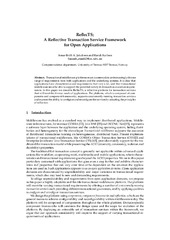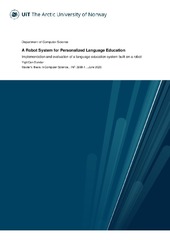Blar i tittel Institutt for informatikk
Viser treff 458-477 av 625
-
Real-time annotation of video streams using staged processing
(Master thesis; Mastergradsoppgave, 2011-06-01)Real-time media rich applications rely on live streams of rich and accurate meta-data describing the video content to provide personal user experiences. Unfortunately, the general amount of video meta-data today is often limited to titles, synopsis and a few keywords. A wildly used approach for extraction of meta-data from video is computer vision. It has been developed a number of different ... -
Real-Time Change Detection with Convolutional Density Approximation
(Journal article; Tidsskriftartikkel; Peer reviewed, 2024-04-02)Background Subtraction (BgS) is a widely researched technique to develop online Change Detection algorithms for static video cameras. Many BgS methods have employed the unsupervised, adaptive approach of Gaussian Mixture Model (GMM) to produce decent backgrounds, but they lack proper consideration of scene semantics to produce better foregrounds. On the other hand, with considerable computational ... -
Real-Time Detection of Events in Soccer Videos using 3D Convolutional Neural Networks
(Chapter; Bokkapittel, 2020)In this paper, we present an algorithm for automatically detecting events in soccer videos using 3D convolutional neural networks. The algorithm uses a sliding window approach to scan over a given video to detect events such as goals, yellow/red cards, and player substitutions. We test the method on three different datasets from SoccerNet, the Swedish Allsvenskan, and the Norwegian Eliteserien. ... -
Real-Time Polyp Detection, Localization and Segmentation in Colonoscopy Using Deep Learning
(Journal article; Tidsskriftartikkel; Peer reviewed, 2021-03-04)Computer-aided detection, localization, and segmentation methods can help improve colonoscopy procedures. Even though many methods have been built to tackle automatic detection and segmentation of polyps, benchmarking of state-of-the-art methods still remains an open problem. This is due to the increasing number of researched computer vision methods that can be applied to polyp datasets. Benchmarking ... -
Real-Time Polyp Detection, Localization and Segmentation in Colonoscopy Using Deep Learning
(Journal article; Tidsskriftartikkel; Peer reviewed, 2021-03-04)Computer-aided detection, localization, and segmentation methods can help improve colonoscopy procedures. Even though many methods have been built to tackle automatic detection and segmentation of polyps, benchmarking of state-of-the-art methods still remains an open problem. This is due to the increasing number of researched computer vision methods that can be applied to polyp datasets. ... -
Recommendations with a Nudge
(Journal article; Tidsskriftartikkel; Peer reviewed, 2019-06-13)In areas such as health, environment, and energy consumption, there is a need to do better. A common goal in society is to get people to behave in ways that are sustainable for the environment or support a healthier lifestyle. Nudging is a term known from economics and political theory, for influencing decisions and behavior using suggestions, positive reinforcement, and other non-coercive means. ... -
Reconstructing Omni-kernel control flow
(Master thesis; Mastergradsoppgave, 2014-12-15)Today, with the prevalence of many- and multi-core systems has it been sparked a new interest for programming models that permits developer to exploit their resources. This has sparked renewed interest in creating larger event-based systems, systems where stack ripping occurs and with an obfuscated control flow. Both increases the complexity of debugging errors. During the development of the ... -
Record linkage of Norwegian historical census data using machine learning
(Mastergradsoppgave; Master thesis, 2022-08-02)The Historical Population Register (HPR) is a project to build the longitudinal life history of individuals by integrating the historical records of the people in Norway since the 19th century. This study attempted to improve the linking rate between the 1875-1900 censuses in HPR, which is currently low, using machine learning approaches. To this end, I developed a machine learning model for linking ... -
Reduce bandwidth in live-streaming by cooperative edge relay networks
(Master thesis; Mastergradsoppgave, 2020-06-30)Live-streaming and particular live video-streaming are becoming increasingly popular as a multimedia-service. More and more types of content and events are live-streamed. Live video-streaming has shown to be a useful tool in the case of pandemic outbursts such as Covid-19. As people should use social distancing, live video-streaming can give people the ability to simulate conventional social ... -
ReflecTS: A reflective transaction service framework for open applications
(Research report; Forskningsrapport, 2004)Transactional middleware platforms must accommodate an increasingly diverse range of requirements from both applications and the underlying systems. It is clear that applications have characteristics and requirements that vary a lot, and that transactional middleware must be able to support the potential variety in transaction execution requirements. In this paper we describe ReflecTS, a reflective ... -
Reinforcement learning application in diabetes blood glucose control: A systematic review
(Journal article; Tidsskriftartikkel; Peer reviewed, 2020-02-21)<p>Background: Reinforcement learning (RL) is a computational approach to understanding and automating goal-directed learning and decision-making. It is designed for problems which include a learning agent interacting with its environment to achieve a goal. For example, blood glucose (BG) control in diabetes mellitus (DM), where the learning agent and its environment are the controller and the body ... -
Report on the final prototype of programming abstractions for energy-efficient inter-process communication
(Research report; Forskningsrapport, 2016)Work package 2 (WP2) aims to develop libraries for energy-efficient inter-processcommunication and data sharing on the EXCESS platforms. The Deliverable D2.4reports on the final prototype of programming abstractions for energy-efficient inter-process communication. Section 1 is the updated overview of the prototype of pro-gramming abstraction and devised power/energy models. The Section 2-6 contain ... -
Reproduction study using public data of: Development and validation of a deep learning algorithm for detection of diabetic retinopathy in retinal fundus photographs
(Journal article; Tidsskriftartikkel; Peer reviewed, 2019-06-06)We have attempted to reproduce the results in <i>Development and validation of a deep learning algorithm for detection of diabetic retinopathy in retinal fundus photographs</i>, published in JAMA 2016; 316(22), using publicly available data sets. We re-implemented the main method in the original study since the source code is not available. The original study used non-public fundus images from EyePACS ... -
Resilient expansion planning of virtual power plant with an integrated energy system considering reliability criteria of lines and towers
(Journal article; Tidsskriftartikkel; Peer reviewed, 2022-05-25)The portfolio of virtual power plants (VPP) is a flexible system for facilitating a wide range of resources with wide geographical coverage. A VPP can be placed at the intersection of electric power and energy systems by adding heat pumps to the portfolio, thereby accelerating the formation of integrated energy systems. VPPs, while virtual, still rely on a physical network for operations. The power ... -
Review of Extracting Information From the Social Web for Health Personalization
(Journal article; Tidsskriftartikkel; Peer reviewed, 2011)In recent years the Web has come into its own as a social platform where health consumers are actively creating and consuming Web content. Moreover, as the Web matures, consumers are gaining access to personalized applications adapted to their health needs and interests. The creation of personalized Web applications relies on extracted information about the users and the content to personalize. The ... -
Revisiting the ‘Whys’ and ‘Hows’ of the Warm-Up: Are We Asking the Right Questions?
(Journal article; Tidsskriftartikkel; Peer reviewed, 2023-09-02)The warm-up is considered benefcial for increasing body temperature, stimulating the neuromuscular system and overall preparing the athletes for the demands of training sessions and competitions. Even when warm-up–derived benefts are slight and transient, they may still beneft preparedness for subsequent eforts. However, sports training and competition performance are highly afected by contextual ... -
RoadAhead - Removing Uncertainty in Travel. Creating a Data Warehouse for Green Transportation Nudging
(Master thesis; Mastergradsoppgave, 2019-06-22)This paper describes a data warehouse approach to environmentally friendly transportation nudging. Transportation makes up a significant part of global carbon emissions. These emissions impacts both the climate and the health of individuals. As such, efforts should be done to address transportation patterns and habits. In addition to the reduction of air pollution, making people more active ... -
RoboMind. A platform for on-the-fly programming and inspection of behavior-based robot programs
(Master thesis; Mastergradsoppgave, 2014-06-01)Lego Mindstorms is a popular tool used by universities for educational and demonstrational purposes. Lego Mindstorms is a set of buildable and programmable robotic kits, made by Lego. It allows for a high level of participation from the audience, while being easily programmable. However, for demonstrational and recruitment purposes, it is not without shortcomings. When there is a limited time to ... -
A Robot System for Personalized Language Education. Implementation and evaluation of a language education system built on a robot
(Master thesis; Mastergradsoppgave, 2020-06-29)As modern computer hardware becomes more affordable, the application areas of Artificial Intelligence (AI) expand and become more feasible to implement efficiently. This aspect opens up opportunities where AI robots can be used to support and improve many areas of human lives. One such area is education, and this thesis project combines AI and education to evaluate whether the results from that union ... -
Robust Reasoning for Autonomous Cyber-Physical Systems in Dynamic Environments
(Journal article; Tidsskriftartikkel; Peer reviewed, 2021)Autonomous cyber-physical systems, CPS, in dynamic environments must work impeccably. The cyber-physical systems must handle tasks consistently and trustworthily, i.e., with a robust behavior. Robust systems, in general, require making valid and solid decisions using one or a combination of robust reasoning strategies, algorithms, and robustness analysis. However, in dynamic environments, data can ...


 English
English norsk
norsk


















